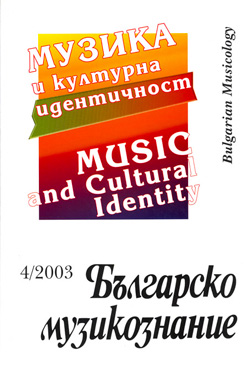В търсене на музикалната ни идентичност. За някои източни музикално-теоретични системи в изследванията на Стоян Джуджев
In Search for Our Musical Identity. On Some Eastern Musical-Theoretical Systems in the Studies of Stoyan Djoudjev
Author(s): Ivanka VlaevaSubject(s): Music
Published by: Институт за изследване на изкуствата, Българска академия на науките
Summary/Abstract: Stoyan Djoudjev is among those scholars of ours, educated within the framework of European tradition, who have the perspicacity and foresight to go beyond the limits of European science. Therefore the researcher turns to some eastern musical-theoretical systems. This study analyzes the way through which Prof. Djoudjev succeeded in discovering the similarities between the Bulgarian and other “eastern” cultures by means of the musical theory created in them. To reflect the peculiarities of Bulgarian national folklore, on the one hand, as a European he could neglect neither the heritage of the ancient Greeks and their knowledge of rhythm and meter, nor the methods of studies developed by modem West European science. On the other hand, the scholar realizes that each object of study needs adequate understanding and appropriate theory for being analyzed. The theory should neither miss, nor distort any essential features of the studied object. Therefore Prof. Djoudjev seeks theoretical systems created on the basis of musical culture with similar characteristics. Thus the question is posed what is characteristic for our own folklore tradition, what is the meaning of “our” and what is foreign, i.e. our identity is sought by means of comparisons. It is found that a theory has already been created, which analyzes metro-rhythmic patterns, analogous to Bulgarian ones (the theory of tala and usula), as well as an elaborate system of melody (with key concepts raga and makam) and the scholar borrows from there what is missing in the West European theory. A conclusion is reached that the Bulgarian musical culture is part of, identical to some extent with a region that stretches to India in the East. This inference provokes reflections concerning the analogies in this quite vast area - whether in some of its parts the foreign is accepted as one’s own and it is not foreign, but genetically inherent, something old and a bit forgotten. The next question arises - what is common and different within this region, because as Prof. Djoudjev points out, nuances and small things make style. Thus by comparing Bulgarian culture with other cultures as well as by using some eastern musical-theoretical systems, Prof. Djoudjev created a theory of Bulgarian folk music, inwhich he strives to present its characteristics most precisely. For this purpose he places Bulgarian folklore in a fairly wide context.
Journal: Българско музикознание
- Issue Year: 2003
- Issue No: 4
- Page Range: 188-197
- Page Count: 10
- Content File-PDF

